Departments
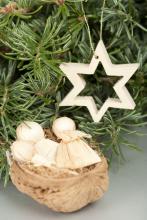
“TAKE OFF THE garment of your sorrow and affliction, O Jerusalem, and put on forever the beauty of the glory from God. Put on the robe of the righteousness that comes from God; put on your head the diadem of the glory of the Everlasting” (Baruch 5:1-2). We might occasionally hear in church a prayer that makes passing use of the phrase “the beauty of holiness,” but it can’t be claimed that we are helped very often to feel that the contagious goodness of God is absolutely lovely, alluring, and attractive. We are called to be beautiful human beings. Christians who are deeply serious about social justice, who carry the burden of the world’s brokenness in their hearts, who are committed to political dissent, probably need this reminder most of all. We can hardly be agents of change if our faces are disfigured by disgust and anger.
Advent may be an especially important time to listen carefully for the Word who summons us to be walking sacraments of God’s radiant beauty. Paul will speak to us about having joy in one another and clothing ourselves in love. We are meant to fill our imaginations in these weeks with the sight of Mary in the radiance of her final days of pregnancy. Doesn’t her beauty lend all the more power to her proclamation, “[God my savior] has brought down the powerful from their thrones, and lifted up the lowly; has filled the hungry with good things, and the rich sent away empty” (Luke 1:52-53)?
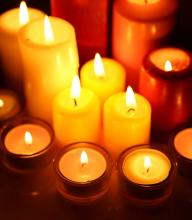
You wait a long time for Christmas morning
drifting asleep even as the ebony slate of sky
shatters in clarion silence
Glory, Hallelujah!
and shepherds in the hills cast down their rods
look up at angels and find themselves
no longer huddled in darkness
but lucent between the stars.
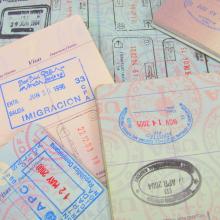
IT WOULD BE strange if any segment of the liturgical year left out the theme of migration. The Bible is riddled from end to end with the journeys of nomads, pilgrims, exiles, returning exiles, and the risky intrusions of strangers across boundaries erected to deter them.
This season’s poster child for divinely inspired mobility is the lovely figure of the Moabite “alien” Ruth, who chooses to leave her own country and accompany her beloved Jewish mother-in-law when she returns as a widow to her native Judea. Ruth’s story is romantic, even erotic, as she daringly slips into the arms of Boaz during the sexually charged siesta at the threshing floor. But our readings are no mere novelette. Scripture shows how much hinged on her pluck and her allure. Her great-grandson will be David, and her descendant Jesus the Messiah!
“Where would we be without immigrants?” is one of the many questions between the lines of the scriptures. The Bible has lots to say to us about the divine impulse active in migrations, and the opening of the heart to “strangers within our gates”—things guaranteed to alarm defensive nationalists of every stripe.
I remember the deep spiritual emotion that caught us all up in Boston’s Faneuil Hall during my naturalization ceremony—Cambodian refugees, Vietnamese grandmothers, Salvadoran families, and all the rest of us. I think of the migration of my own great-grandparents to Russia, and the adventures that have scattered my own family from New Zealand to Mexico. How God revels in mixing us all up!
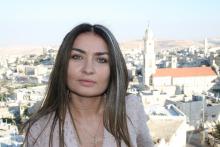
Bio: Catholic Palestinian film director and founder of the nonprofit Open Bethlehem. operationbethlehem.com
1. How did Open Bethlehem get started?
Growing up in Bethlehem, I always wanted to leave. I settled in London, but when events started becoming worse and worse in the region, I wanted to do something. So I went back and started working on a film. My cousin encouraged me and said, “Look at what’s happening to our city. Why don’t you do more than just a film?” And so together, in 2005, we started a campaign called Open Bethlehem.
2. What is its main goal?
The idea is to use Bethlehem as a doorway into the region. We created the Bethlehem Passport, which is like an honorary citizenship, inviting people to partake in the town that stands for joy and goodwill to all. The passport is an appeal to everybody to do something to help bring peace to the Middle East. We aim mostly at educating people abroad—policymakers, the media, and church leaders—about the plight of Bethlehem, its Christian community, and the diversity of the city.

He uproots teeth primordial in nature and that eat his soul
with appetite the size of mercenary forces plundering a city
whose inhabitants do not fight back because most of them
are women, children, and animals that creep on all fours.
He knows of a city not spared and is without name, unlike Nineveh,
whose repentant king decreed:
Human beings and animals shall be covered with sackcloth,
and they shall cry mightily to God.
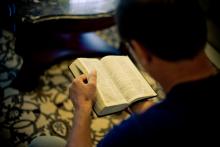
OUR READINGS FROM Hebrews yield one of the most intense images for the experience of being addressed by the Holy One: “Indeed the word of God is living and active, sharper than any two-edged sword, piercing until it divides soul from spirit, joints from marrow: It is able to judge the thoughts and intentions of the heart. And before God no creature is hidden, but all are naked and laid bare to the eyes of the one to whom we must render an account” (12: 4-16). Those who passionately feel convicted by the Word to work for the transformation of the broken and unjust structures of society need to witness to our own continuous religious experience of being penetrated, judged, and aroused in our living conversation through scripture. Otherwise people might mistakenly imagine that this strong language somehow belongs to those who extol the inerrant authority of scripture while finding in it support for reactionary values.
A prison chaplain gave a new inmate a Bible. Asked later what he made of it, the prisoner replied simply, “I didn’t read the book; it read me.” And this isn’t an occult experience. We allow ourselves to be addressed whenever we drop those filters that screen out impressions that threaten upheaval for the status quo. A critic once said of Austrian artist Oscar Kokoschka’s drawings, “We don’t look at them, they look at us, searching, probing, and testing us,” and these words come back to me often when I open the Bible for meditation, and drop my defenses.

About love she was all wrong,
the old capitalist, patron saint
of the self-made rich. How well
she misunderstood the paradox deep
as mothers’ grief: that finding our self
requires losing it, that love and loss
make one truth, not two. Objective
as granite in relationships, her hero
never collapses into cancer with a wife,
never drops into death with a brother.
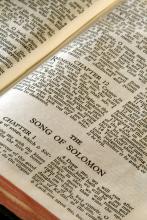
Reflections on the Common Lectionary, Cycle B